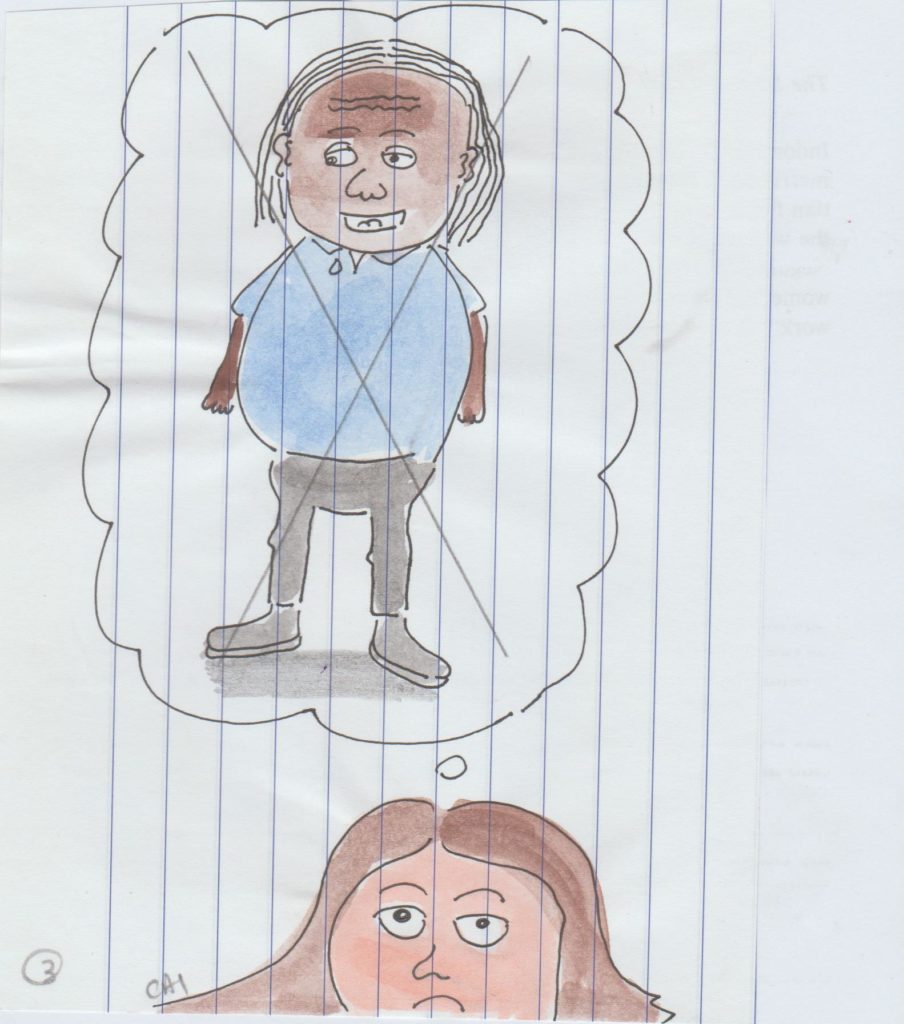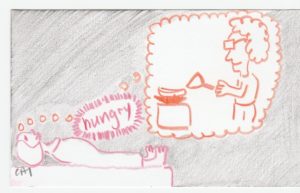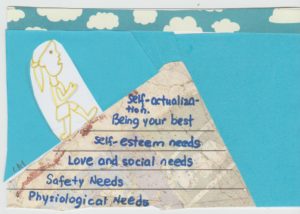One of my earliest memories in dream interpretation, is being told that in a certain culture, seeing dream imagery of a smiling old deceased relative, means they are sad and crying. Worse, the dead appear in dreams to convey messages. So when you see a dead person in a dream and they are smiling, it means they are crying for you.
The waking world is straightforward while the dream world uses opposite imagery to convey the message for interpretation.
What is happiness and what is sadness? This is an age old question. Are happiness and sadness opposites? Does it mean when we are in one state, like in happiness, we are not sad? And when we are sad, we can not feel happy?
Depression is defined as being sad in a low mood for at least two weeks. There are people who have primary and secondary needs, and yet they are depressed, But how can we be depressed when we have all that we need as according to Maslow’s Hierarchy of Needs? We have primary needs, secondary needs and maybe also our tertiary needs. According to Maslow’s pyramid, happiness would fall into the second tier, which is of secondary needs. This does not mean that people who have their secondary needs, are happy. These people may still be unhappy and sad.
These two statements are not absolute truths. Every individual is unique. We have a personal state of equilibrium. That is our static state; when we do not have input stimuli to influence our mood.
Some of us have an equilibrium of being in the negative . We enjoy brief spurts of happiness. Then we fall back to earth and revert to our former negative self. No amount of positive stimuli can flip change our equilibrium to become a permanently positive person.
On the contrary, some of us are in positive state for our equilibrium. We may be slammed down, but we don’t stay down. We always have a reason to bounce up.
I respect mental health advocates, especially patients of psychological disorders. In this post, we are focused on depression and its cursory opposite, happiness. Depression is a state that lasts because it is un-natural. It is a mental disorder. Some factors are due to genetically inherited DNA, low level of serotonin or other mood hormones, state of equilibrium & etc.
In the study of psychology, we are taught that dreams continue the themes in waking life. So if our waking hours are filled with happiness, then it follows that our dreams should contain happiness.
The year of 2020 has been an extraordinarily difficult one. It is the Year of the Coronavirus, where social distancing, self-isolation, quarantine became the norm. Everyone felt disturbed when we had to miss out on social activities. Everyone was inflicted with Fear Of Missing Out. As the months passed, we felt accustomed to isolation. We love having more time to read, write, draw and do whatever we didn’t have time to do when life was a rat race. We used to be defined by our choices – our choice of work, career, religion, place of residence, sports, food and etc. Even when we do not choose a selection, we are also defined by our inaction.
Why are there unhappy people?
What is there that makes a person unhappy? If the cause of trouble was removed, would that person become happy? What if the discontent was internal and not due to external factors? If the problem lies in external causes, the person would try to remove the problems (fight), or remove themselves from the troubled spot (take flight).
There are also “lost souls”, who are unhappy because they think the world owes them a living. They don’t know what they want. If they did know for a brief period and got what they desired, they lose interest in their novelty and return to being grumbling, unhappy people.
People who are constantly unhappy should consult their medical doctor or psychiatrist. They will benefit from tests to derive at empirical evidence for probable causes for their unhappiness. For instance, a blood test may show the chemical composition of their blood. A doctor would be able to diagnose if there is evidence of chemical imbalances.
There used to be better boundaries between work and home. Since the revolution of Covid-19, the culture of work-from-home has crumbled the boundaries of work and play. If there was unhappiness at work, now it has been brought into the home. Home has become an unhappy place too. If you used to dream of leisure and non-work topics, you might find your dream scape changing. You may dream of work, since work is now lying next to you at home.
Can you induce happiness in yourself?
Dmitry Golubnichy started his happiness project when he realized he was dissatisfied in spite of having almost everything he could ask for (according to Maslow’s Hierarchy of Needs). He slowly discovered that happiness was not dependent on material acquisitions. Happiness was found in simple joys. He invented the 100 Happy Days Challenge to encourage others to rediscover joys in the simple pleasures in life. (Golubnichy, 2017).
If you decide to try this movement, use the hash tag #100HappyDays when you post on any social media or your own website. The online community who are doing this challenge may connect with you when they search for fellow practitioners. I’ve participated in some of the #100HappyDays challenge. If you’re interested, click on the hyperlink to take a look.
Looking at art
Looking at art is another way to bring forth feelings of happiness. When you look at art, you stimulate your sense of sight, your mind and other senses. This stimulation makes you feel happy. Art is in everything and everyone. Art is in nature and human beings. We are works of art by our creators. (Payne, 2017). When we spend time taking care of ourselves, we’re putting effort in our art and we feel happy. This partially explains how we get the happy feeling boost when we shop, eat, drink, do a hobby and spend time on recreational activities.
Sometimes, people, events and yourself are factors that determine your happiness. If we know how to handle these factors, we can win some happiness back from the brink of unhappiness. I read a great book entitled You Make Yourself Unhappy, by J. Kelly. This is what he wrote:
You make yourself unhappy when
- You ignore the significance of actions being louder than words. You make yourself unhappy when others’ actions upset you and you don’t inform them about this. Thus, to make ourselves happy, we must speak up to request for justice.
- You lack self-respect and allow others to take advantage of you. When you respect yourself, others will sit up and respect you too. Then you can bask in the warmth and glow.
- You don’t communicate and inform others of your opinions/ requirements. You have your rights and personal boundaries. You’ll be happy when you own your personal space.
- You don’t work towards achieving your happiness. You need to do the practices that help you achieve success in whatever you’re pursuing.
- You chase unrealistic goals which can not be obtained. When you are realistic and practical, you make yourself happy when you achieve your goals.
- Every action has a reaction. If you select bad choices, you will receive bad consequences. Therefore, pick good choices and reap their inherent rewards.
- Learn/ try new skills/ experiences and feel the adrenalin rush. Create your happy feelings.
(Kelly, 2020)
Here are several ways to rein in your spending to make yourself happier.
- Do you chase after the pot of gold at the end of the rainbow? Do you spend money and time on buying tickets for the lottery? There are very slim chances of winning the lottery.
2. Gambling in the stock market? The prices of stocks fluctuate according to several factors which are beyond control. Stop gambling.
3. Maxing out your credit cards? Just because you have one, doesn’t mean you should use it. Just because you can buy things on credit and max out your spending limit, doesn’t mean you should do that.
4. And buying branded goods? You should not choose to become a slave to work to repay debts incurred from spending money on branded goods.
Normally, for most people, they see dreams which continue themes they have in their waking reality. Thus, if they are unhappy in their day, they would dream of unhappiness in their night’s dreams. Mr. Kelly presents a strong view that we should edit our lives to live as happily as we can. Consequentially, other aspects of our lives would fall into place.
Reference
Golubnichy, D. (2017). Can You Be Happy For 100 Days In A Row? Artisan: New York.
#100HappyDays is the hash tag for a series of posts in this 100 Day Challenge to help you re-invent yourself and become a happy person.
Kelly, J. (2020). You Make Yourself Unhappy. Amazon books: Delaware.
Kelly, J. (2020). You Cause Your Own Misery. Amazon books: Delaware. (To Be Read)
Payne, B. W. (2017). How Art Can Make You Happy. Chronicle Books: San Francisco, USA.
Wehrenberg, M. (2020). Is happiness the opposite of depression – or its enemy. Psychology Today. DOI: November 7 2020. (Rating: Not my favorite kind of article. )
#PaidLink #ad with small #CommissionsEarned:
Kelly, J.
]]>The old man told his boss and colleagues, that the woman had no man and was searching for a man. Old Man said he wants to be the man. He said the other male colleagues should also try to be the man for that woman. They should all vie for the woman’s hand.
Psychological analysis of male courting behavior:
When the old man is on menopause and post virile, there is no logical cause for him to seek sexual gratification. Viagra might assist but only if he does not have existing medical conditions that over-ride his physical abilities to perform in bed. He is ageing and deteriorating. He more likely desires a nurse and a servant to take care of his primary needs. According to Maslow’s Hierarchy of Needs, there are five levels of needs for every human being. These are primary physiological needs and safety, followed by secondary needs like love and belonging, self-esteem, and self-actualization. For an old man who has challenges in poor health and basic physiological needs, he can not move past his basic obstacles. It is unlikely he can even think of courting a woman for secondary desires like love, belonging, self-esteem and self-actualization. It is more likely that the Old Man pretends to be interested in the woman because he has ulterior motives.

I do not know you yet. I don’t know if you’ll ever be born, or if you would be a male or female.
I’m sorry I’m not around to speak to you in person. I started my life late and absolutely have no glimmer of hope to meet you. Unless I live past 100, which is unlikely due to my fragile state.
There are three things I wish to leave behind for you. If I had to choose only one, I would choose Number 2.
Firstly, I would leave you my diamond pendant, because a diamond lasts for eternity if it remains in your mother’s and grandmother’s possessions. They would need to preserve it for you, if they can manage their purses. Failing that, I would leave you the next best thing, which is the main guide(s) in life.
Secondly, I want to leave behind some advice. I wish you to know that you need to walk on the right path. Maslow’s Hierarchy of Needs explains the main occupations of almost everyone’s path. The Erik Erikson theory of Psychological Stages of mankind will provide clarification of the crisis in your journey onwards towards age.
Thirdly, I leave behind my wish of good luck to you.
Yours sincerely,
Great-grandma.
Writing prompt from:
]]>Happy Saturday, #WritingCommunity ! I’m back with another #WritingPrompt after an unanticipated break. I’ve missed you all. Stay tuned for the results, and feel free to comment with your responses to the prompt. I’d love to read your letters! #amwriting pic.twitter.com/qeIRTZzlr9
— P.S. 5280 (@ps_5280) June 6, 2020

A hungry person’s dreams are likely to be about food. The internal organ (stomach), sends signals (stimulus) to the brain informing the body wants food. The brain activates memory cells that store images of food and related to cooking food. The dreamer may wake up soon and know that food is required by the body.
Rarely do dream imagery of food contain metaphorical symbolism. When they do, it can mean that the dreamer may be craving for food that is not material and tangible. The kind of food that is emotional and spiritual. Maslow’s Hierarchy of Needs is a theory that says every person has needs and desires that range from the very basic, to secondary, and tertiary levels. Apart from the primary needs of food, water and shelter, the next level of secondary needs involve love, security (physical, emotional and spiritual). Dream imagery of food can be a metaphor to inform of secondary needs for safety, love, self-esteem and lastly, being the best human being one can be.

The meaning of dreams related to hunger and food are universal. That is, the dream analysis and meaning can be applied to man and woman. For complicated dreams, more analysis need to be done in dreamwork with a qualified therapist.
]]>